Green Management
Environmental Management and Accountability Environmental Initiatives Green Cooperation Conservation Campaigns
The Department always places ecological considerations in high priorities in every aspect of its operation. We strictly comply with relevant laws, regulations and standards pertaining to environmental protection, and strive to maintain best results and achieve further improvements. Correctional facilities are designed and operated in an environmentally friendly manner, while conservation of resources remains tightly enforced throughout. Going hand in hand, waste reduction, recycling, ecologically-sound supplies and education of staff and persons in custody are all pivotal components in departmental efforts towards good stewardship of the environment.
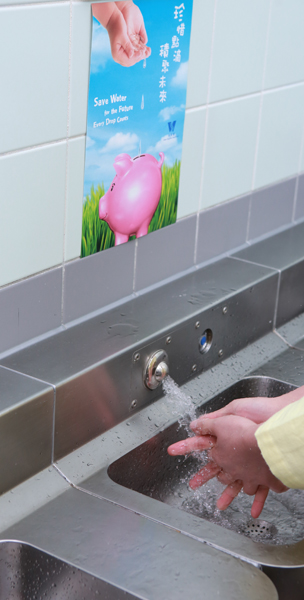
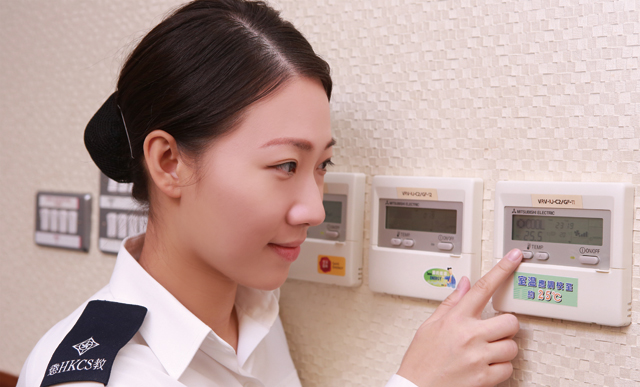
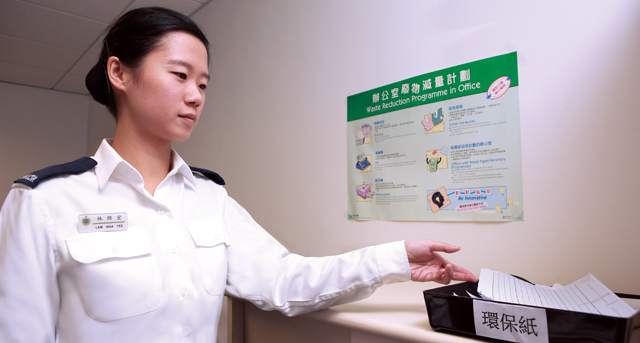
The Department strives to implement measures to save energy and raises the environmental protection awareness of staff and persons in custody through recycling.
[Back to top]
Environmental Management and Accountability
To facilitate the coordination of environmental work in the Department, the Green Manager’s Committee was formed in 1999. It sets environmental objectives and adopts measures in line with the government’s environmental policies. The Environmental Auditing Team conducts comprehensive audit at institutions, reports the findings and makes recommendations to the Committee for sharing among staff members. Nei Kwu Correctional Institution and Tai Lam Correctional Institution were chosen as audit targets in 2015.
[Back to top]
Environmental Initiatives
Our environmental initiatives include energy conservation and use of renewable energy, green housekeeping and gradual replacement of conventional electrical appliances and lighting with energy saving types. The Department adheres to full accountability in resource utilisation and works vigilantly to limit wastage, conserve water and control office-related consumption. In 2015, we explored the feasibility of producing more environmentally friendly tactile slabs, and implemented a trial scheme in the staff quarters in Tai Lam. Under the scheme, waste glass bottles were collected, and crushed into glass sand by machines to replace part of the commonly-used natural river sand for the production of tactile slabs with concrete mix in the precast concrete workshop of Tai Lam Correctional Institution. In addition, we will continue to make efforts to implement source separation of wastes at facilities and staff quarters, improve recycling efficiency for materials used in workshops and food waste from institutions, increase procurement of raw materials and equipment with minimal adverse environmental impacts for industrial production, and refurbish and repair the worn and torn fiberglass institution furniture to reduce solid wastes, etc. Chemical and clinical by-products from facilities are handled by licensed contractors and strictly regulated. Emissions controls have been augmented in both institutional infrastructure and all motor vehicles of the Department.
In respect of food waste management, apart from Lo Wu Correctional Institution (LWCI), CSD signed the Food Wise Charter with the Environmental Protection Department in October 2015. Moreover, the "Waste No Food" Scheme has been run by LWCI to reduce leftover in meals for the third consecutive year. Persons in custody are encouraged to reduce the portion of their staple food including rice, chapatti and potatoes on a voluntary basis. In 2015, around 80% of the penal population at the Institution has joined the Scheme, resulting in an estimated average of about 15 000 bowls of rice being saved each month. In view of the encouraging response to the Scheme, it has been extended to Nei Kwu Correctional Institution, Tai Lam Centre for Women and the Elderly Unit of Tai Lam Correctional Institution in 2013 and 2014. In addition to the one installed at LWCI, a food waste decomposing machine was also installed at Stanley Prison in 2015. The decomposing machines process the leftover collected into organic fertiliser. The organic fertiliser is used for growing plants in the vicinity of the Institutions for greening purposes.
Sewage treatment and filtration systems are regularly inspected and upgraded to prevent the discharge of polluted effluent and to rein in any possible sources of contamination. Noise pollution reduction is another major issue. Noise levels at all locations are monitored and, where necessary and notably at workshops, proper ear protection devices are provided. Regular indoor air quality assessments are also conducted to safeguard the health and well-being of all.
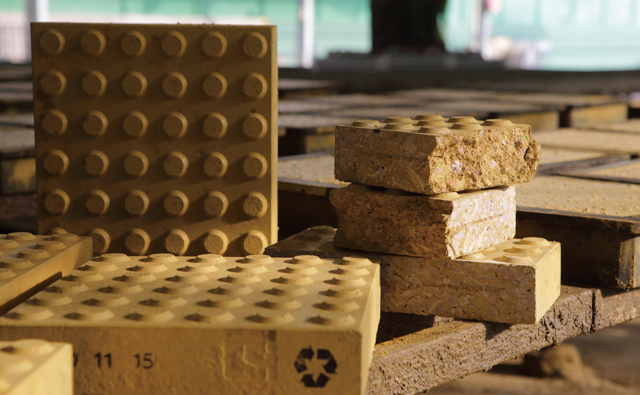
Tactile slabs with glass sand.
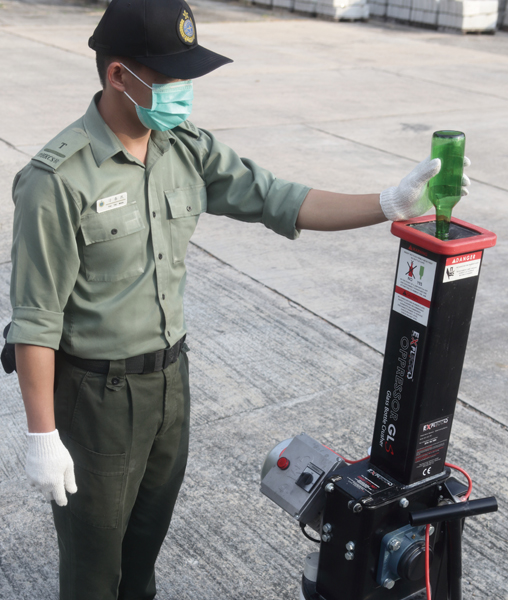
Under a trial scheme in the staff quarters in Tai Lam, waste glass bottles are collected and crushed into glass sand by machines for the production of tactile slabs with concrete mix in the precast concrete workshop of Tai Lam Correctional Institution.
[Back to top]
Green Cooperation
Environmental campaigns are made possible through close ties with other agencies and organisations. In cooperation with the Water Supplies Department, we have carried out works to monitor water flow in 10 institutions with a view to formulating the best practice guides for compliance by institutions to boost water efficiency in institutions.
On energy conservation, the Chief Executive has, in his 2015 Policy Address, announced a new target of achieving a 5% saving in electricity consumption for government buildings under comparable operating conditions between the year 2015-16 and 2019-20. The Department is working proactively with the Electrical and Mechanical Services Department (EMSD) to meet the target. In 2015-16, the EMSD will arrange to conduct energy audit at 10 correctional institutions with higher energy consumption. Energy audit at another 11 institutions with higher energy consumption will be completed by 2017-18. Energy management opportunities will be identified by using more energy efficient lighting facilities, air-conditioning system and machinery, etc.
[Back to top]
Conservation Campaigns
We use suppliers complying with high environmental standards, and strive to educate our staff and persons in custody with conservation training and formal ecology-related classes. To promote the awareness of staff and the public on environmental conservation, we took part in the annual Hong Kong Flower Show and won notable accolades for our efforts.
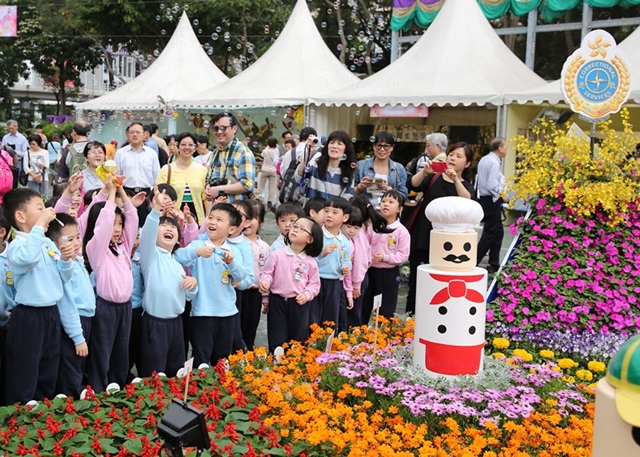
Kindergarten children play gleefully while visiting CSD’s booth in the Hong Kong Flower Show.
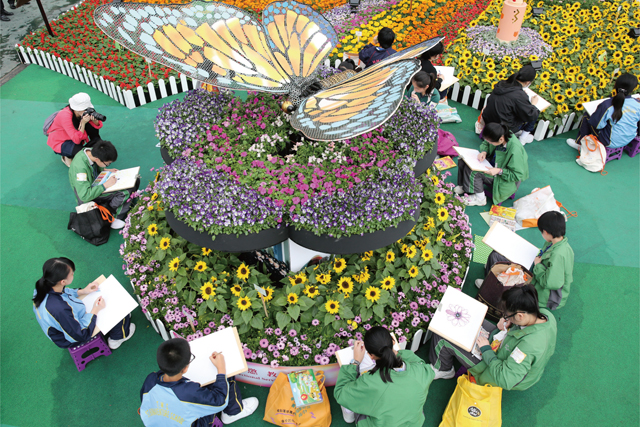
A rehabilitation butterfly made from recycled materials flutters at the Hong Kong Flower Show, and attracts many visitors to draw pictures of its movement.